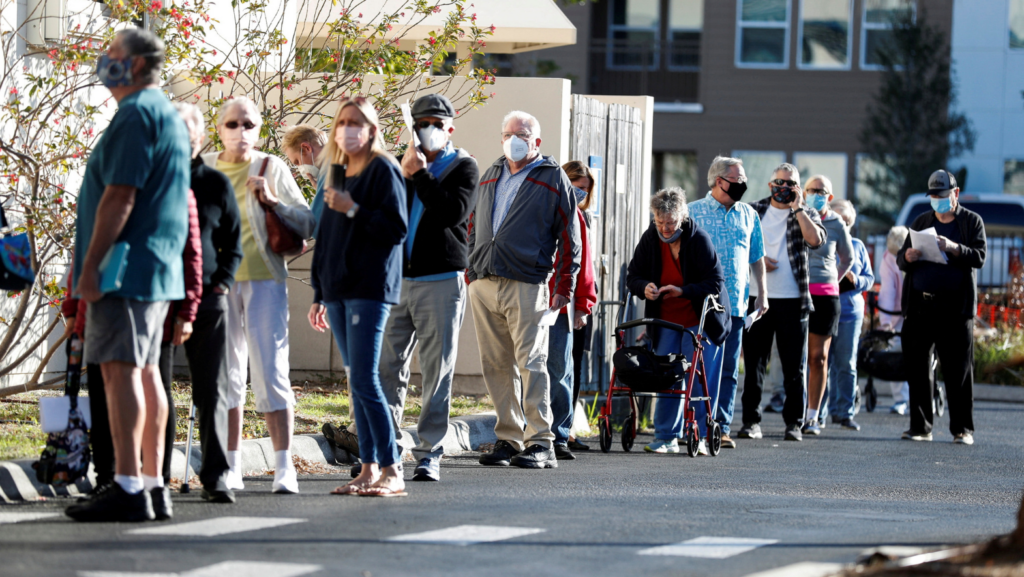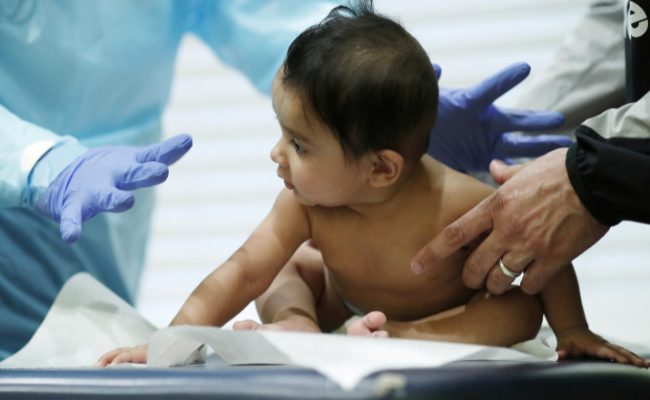US life expectancy increases in 2022 after COVID retreat

Seniors, who are 65 and over, wait in line at the Department of Health Sarasota COVID-19 Vaccination Clinic in Sarasota, Florida, U.S. January 4, 2021. REUTERS/Octavio Jones/File Photo
U.S. babies born in 2022 gained roughly a year in life expectancy compared with babies born a year earlier, federal data showed on Wednesday, marking progress after two consecutive years of declines largely due to the COVID-19 pandemic.
Life expectancy at birth for 2022 newborns was 77.5 years, up from 76.4 in 2021 but still lower than the 78.8 years expected for those born in 2019, data from the U.S. Centers for Disease Control and Prevention (CDC) suggests.
It will take “some time before we’re back to where we were in 2019, before the pandemic,” said Elizabeth Arias, a CDC researcher who worked on the report.
The study estimated babies’ life expectancy if mortality conditions when they were born were to persist throughout their lives.
“There were positive outcomes all around … all the groups by race and sex experienced increases in life expectancy,” Arias said.
Life expectancy increased over 2021 levels by the most for American Indian and Alaska Native non-Hispanic newborns, by 2.3 years, from 65.6 to 67.9, followed by an increase of 2.2 years for Hispanic newborns from 77.8 to 80.

A doctor performs a routine checkup with a baby at his pediatric practice in Oyster Bay, New York, U.S., April 13, 2020. REUTERS/Lucas Jackson/File Photo
Black non-Hispanic Americans, who were disproportionately impacted by the pandemic, had life expectancy increase by 1.6 years, from 71.2 to 72.8, resulting primarily from decreases in mortality due to COVID-19, followed by declines in deaths from heart disease, homicide, diabetes, and cancer.
Life expectancy increased by 1 year for Asian non-Hispanic infants to 84.5 years, and by 0.8 year for White non-Hispanic babies to 77.5.
In all groups, previous declines in mortality due to COVID explained more than 80% of the increases in life expectancy, according to the report.
Declines in deaths from heart disease, unintentional injuries, cancer, and homicide also contributed to longer life expectancy overall, but their impact varied.
In the American Indian and Alaska Native population and the Hispanic population, for example, increases in life expectancy would have been greater if not for offsetting increases in mortality due to unintentional injuries.
Improvements in life expectancy for non-Hispanic Black babies were offset by increases in mortality due to perinatal conditions, congenital malformations, kidney disease, nutritional deficiencies, and legal intervention, a reference to deaths due to injuries inflicted by police or other law enforcement agents.
As usual, life expectancy remains longer for females. In 2020, the difference between the sexes reached 6 years, a level not seen since 1996. In 2022, that gap had narrowed to 5.4 years, down from 5.8 years in 2021.
The data for 2022 is provisional, meaning that it may change and has several limitations, including a difference in timeliness in submitting death certificates by some jurisdictions.

